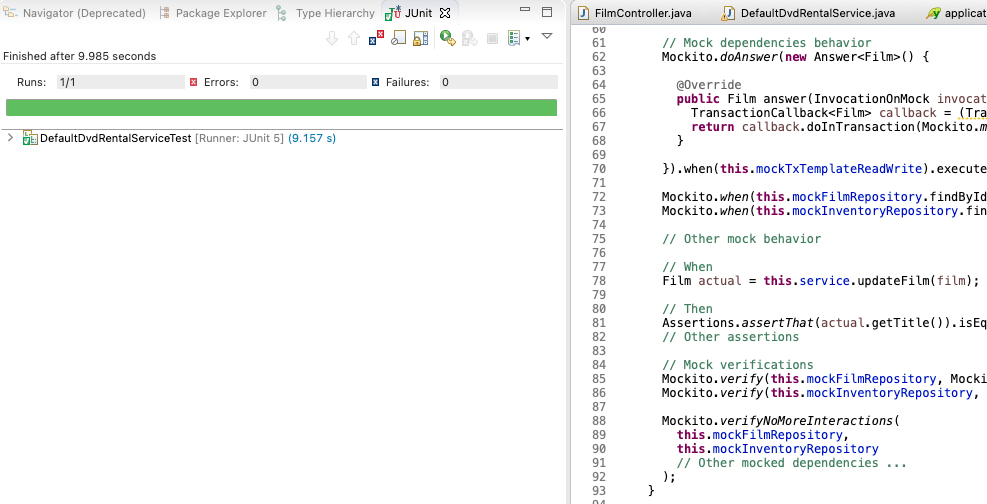Search results
Unit testing Spring's TransationTemplate, TransactionCallback with JUnit and Mockito
1. OVERVIEW
Let’s say you had to write a Business Service implementation using Spring TransactionTemplate instead of the @Transactional annotation.
As a quick example, you need to retrieve a film reviews from external partners using RESTful APIs.
You also need to update this film-related relational database tables rows.
And lastly, you need to publish a JMS message for interested parties to process these changes.
A made up example, but the point is that you need to write a Business Logic that involves sending RESTful API requests to external services, executing multiple SQL statements, and publishing a message to a JMS Queue.
You have already realized that the RESTful API requests and publishing a JMS message shouldn’t be part of the JDBC transaction, so you end up using TransactionTemplate, and a code snippet similar to:
DefaultDvdRentalService.java:
1
2
3
4
5
6
7
8
9
10
11
12
13
14
15
16
17
18
19
20
21
22
23
24
25
26
27
28
29
30
@Service
public class DefaultDvdRentalService implements DvdRentalService {
private final FilmRepository filmRepository;
private final InventoryRepository inventoryRepository;
private final TransactionTemplate txTemplateReadWrite;
// Other dependencies ...
@Override
public Film updateFilm(Film film) {
// External requests to retrieve 3rd party film reviews using RestTemplate
// ...
// Updates a film using multiple repositories in the same SQL transaction
Film result = this.txTemplateReadWrite.execute(status -> {
Optional<Film> optFilm = this.filmRepository.findById(film.getFilmId());
List<Inventory> inventories = this.inventoryRepository.findByFilmFilmId(film.getFilmId());
// ...
// Other Spring Data JPA repositories usage.
return optFilm.orElseThrow(() -> new RuntimeException("..."));
});
// Publishes a JMS message to a Queue using JmsTemplate
// ...
return result;
}
// ...
}
Now you’ll need to write some unit tests.
How would you mock TransactionTemplate?
If you mock the execute() method returning a Film instance, you won’t unit test what’s happening inside the TransactionTemplate’s execute() method.
This blog post covers how to use Mockito.doAnswer() to unit test the code inside TransactionCallback’s doInTransaction(), or TransactionCallbackWithoutResult’s doInTransactionWithoutResult() implementations.
The approach discussed in this post not only applies to TransactionTemplate and TransactionCallback or TransactionCallbackWithoutResult, but in general to implementations that use the Template with Callback design pattern.
These are other blog posts that use the Template and Callback design pattern:
Writing dynamic SQL queries using Spring Data JPA Specification and Criteria API
Writing dynamic SQL queries using Spring Data JPA repositories and EntityManager
Writing dynamic SQL queries using Spring Data JPA repositories, Hibernate and Querydsl
2. JUNIT 5, MOCKITO, SPRING-BOOT-STARTER-TEST VERSIONS
This blog post assumes you are JUnit 5 and Mockito 3 or higher through spring-boot-starter-test dependency included in Spring Boot 2.2.x or higher.
3. UNIT TEST CLASS
Let’s write a DefaultDvdRentalService.java happy path unit test that covers updating a film:
DefaultDvdRentalServiceTest.java:
@ExtendWith(MockitoExtension.class)
public class DefaultDvdRentalServiceTest {
@Mock
private FilmRepository mockFilmRepository;
@Mock
private InventoryRepository mockInventoryRepository;
@Mock
private TransactionTemplate mockTxTemplateReadWrite;
// Other mocked dependencies ...
private DvdRentalService service;
@BeforeEach
public void setup() {
this.service = new DefaultDvdRentalService(this.mockFilmRepository, // ...);
}
@Test
public void shouldUpdateFilm() {
// Given
// Create test fixtures
Film film = FilmFixtures.createFilm();
Inventory inventory = FilmFixtures.createInventory(film);
// ...
// Mock dependencies behavior
Mockito.doAnswer(new Answer<Film>() {
@Override
public Film answer(InvocationOnMock invocation) throws Throwable {
TransactionCallback<Film> callback = (TransactionCallback<Film>) invocation.getArguments()[0];
return callback.doInTransaction(Mockito.mock(TransactionStatus.class));
}
}).when(this.mockTxTemplateReadWrite).execute(Mockito.any());
Mockito.when(this.mockFilmRepository.findById(10)).thenReturn(Optional.of(film));
Mockito.when(this.mockInventoryRepository.findByFilmFilmId(10)).thenReturn(Lists.list(inventory));
// Other mock behavior
// When
Film actual = this.service.updateFilm(film);
// Then
Assertions.assertThat(actual.getTitle()).isEqualTo("Title");
// Other assertions
// Mock verifications
Mockito.verify(this.mockFilmRepository, Mockito.times(1)).findById(10);
Mockito.verify(this.mockInventoryRepository, Mockito.times(1)).findByFilmFilmId(10);
// Other mocks verification
Mockito.verifyNoMoreInteractions(
this.mockFilmRepository,
this.mockInventoryRepository
// Other mocked dependencies ...
);
}
// ...
}
The unit test still mocks the TransactionTemplate dependency.
The key here is the Mockito.doAnswer() behavior configuration.
This behavior is configured to execute the real callback.doInTransaction() lines 16 through 21 when the TransactionTemplate’s execute() method is called.
Let’s dig in a bit:
- First:
TransactionCallback<Film> callback = (TransactionCallback<Film>) invocation.getArguments()[0];
returns the first argument passed to the execute() method. In this case, the only argument passed to execute() was the TransactionCallback Lambda implementation (lines 16 through 21).
- And second:
return callback.doInTransaction(Mockito.mock(TransactionStatus.class));
executes the real TransactionCallback Lambda implementation (lines 16 through 21).
You need to continue configuring the unit test mocks behaviors because the TransactionCallback implementation uses FilmRepository and InventoryRepository.
Mockito.when(this.mockFilmRepository.findById(10))...
Mockito.when(this.mockInventoryRepository.findByFilmFilmId(10))...
Later, the unit test verifies the mocked dependencies methods execution, and that there shouldn’t be other mock calls, using Mockito.verify(), and Mockito.verifyNoMoreInteractions().
 TransactionTemplate, TransactionCallback unit test with JUnit and Mockito
TransactionTemplate, TransactionCallback unit test with JUnit and Mockito
4. CONCLUSION
Mockito.doAnswer() helps you to unit test code that uses Template with Callback design pattern.
You can mock TransactionTemplate’s execute() method and still verify behavior inside TransactionCallback’s doInTransaction(), or TransactionCallbackWithoutResult’s doInTransactionWithoutResult() implementations using Mockito.doAnswer(), for more accurate unit testing.
Thanks for reading and as always, feedback is very much appreciated. If you found this post helpful and would like to receive updates when content like this gets published, sign up to the newsletter.
NEED HELP?
I provide Consulting Services.ABOUT THE AUTHOR






